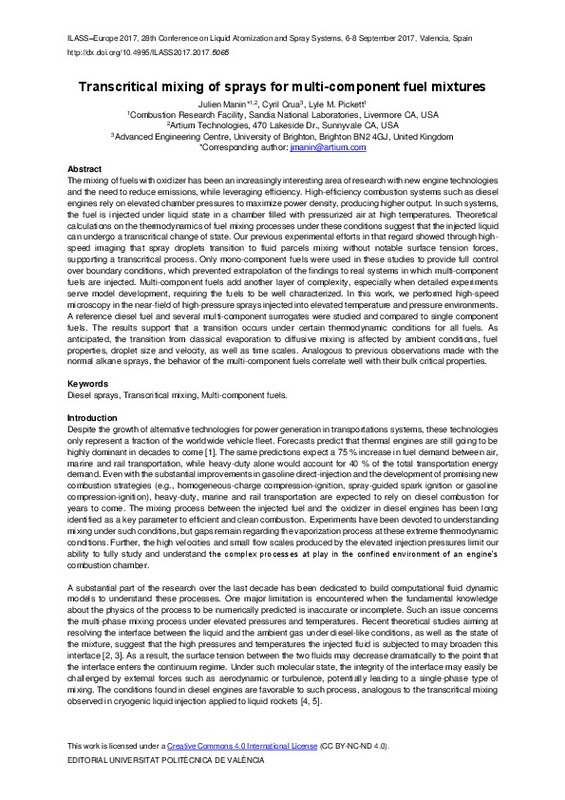Manin, J.; Crua, C.; Pickett, LM. (2017). Transcritical mixing of sprays for multi-component fuel mixtures. En Ilass Europe. 28th european conference on Liquid Atomization and Spray Systems. Editorial Universitat Politècnica de València. 553-560. https://doi.org/10.4995/ILASS2017.2017.5065
Por favor, use este identificador para citar o enlazar este ítem: http://hdl.handle.net/10251/100373
|
Título:
|
Transcritical mixing of sprays for multi-component fuel mixtures
|
|
Autor:
|
Manin, Julien
Crua, Cyril
Pickett, Lyle M.
|
|
Fecha difusión:
|
|
|
Resumen:
|
[EN] The mixing of fuels with oxidizer has been an increasingly interesting area of research with new engine technologies
and the need to reduce emissions, while leveraging efficiency. High-efficiency combustion systems ...[+]
[EN] The mixing of fuels with oxidizer has been an increasingly interesting area of research with new engine technologies
and the need to reduce emissions, while leveraging efficiency. High-efficiency combustion systems such as diesel
engines rely on elevated chamber pressures to maximize power density, producing higher output. In such systems,
the fuel is injected under liquid state in a chamber filled with pressurized air at high temperatures. Theoretical
calculations on the thermodynamics of fuel mixing processes under these conditions suggest that the injected liquid
can undergo a transcritical change of state. Our previous experimental efforts in that regard showed through highspeed
imaging that spray droplets transition to fluid parcels mixing without notable surface tension forces,
supporting a transcritical process. Only mono-component fuels were used in these studies to provide full control
over boundary conditions, which prevented extrapolation of the findings to real systems in which multi-component
fuels are injected. Multi-component fuels add another layer of complexity, especially when detailed experiments
serve model development, requiring the fuels to be well characterized. In this work, we performed high-speed
microscopy in the near-field of high-pressure sprays injected into elevated temperature and pressure environments.
A reference diesel fuel and several multi-component surrogates were studied and compared to single component
fuels. The results support that a transition occurs under certain thermodynamic conditions for all fuels. As
anticipated, the transition from classical evaporation to diffusive mixing is affected by ambient conditions, fuel
properties, droplet size and velocity, as well as time scales. Analogous to previous observations made with the
normal alkane sprays, the behavior of the multi-component fuels correlate well with their bulk critical properties.
[-]
|
|
Palabras clave:
|
Diesel sprays
,
Transcritical mixing
,
Multi-component fuels
|
|
Derechos de uso:
|
Reconocimiento - No comercial - Sin obra derivada (by-nc-nd)
|
|
ISBN:
|
9788490485804
|
|
Fuente:
|
Ilass Europe. 28th european conference on Liquid Atomization and Spray Systems.
|
|
DOI:
|
10.4995/ILASS2017.2017.5065
|
|
Editorial:
|
Editorial Universitat Politècnica de València
|
|
Versión del editor:
|
http://ocs.editorial.upv.es/index.php/ILASS/ILASS2017/paper/view/5065
|
|
Título del congreso:
|
ILASS2017 - 28th European Conference on Liquid Atomization and Spray Systems
|
|
Lugar del congreso:
|
Valencia, Spain
|
|
Fecha congreso:
|
September 06-08,2017
|
|
Código del Proyecto:
|
info:eu-repo/grantAgreement/UKRI//EP%2FK020528%2F1/GB/Investigation of Non-Spherical Droplets in High-Pressure Fuel Sprays/
|
|
Agradecimientos:
|
This work was supported by the UK’s Engineering and Physical Science Research Council [grant number EP/K020528/1]. The authors gratefully acknowledge Coordinating Research Council Project AVFL-18a for formulating, ...[+]
This work was supported by the UK’s Engineering and Physical Science Research Council [grant number EP/K020528/1]. The authors gratefully acknowledge Coordinating Research Council Project AVFL-18a for formulating, characterizing, and providing the target and surrogate fuels used in this study. This study was performed at the Combustion Research Facility, Sandia National Laboratories is a multi-mission laboratory managed and operated by National Technology and Engineering Solutions of Sandia, LLC., a wholly owned subsidiary of Honeywell International, Inc., for the U.S. Department of Energy’s National Nuclear Security Administration under contract DE-NA0003525.
[-]
|
|
Tipo:
|
Capítulo de libro
Comunicación en congreso
|








